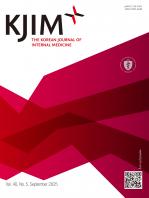|
Nephrology / Review
Korean Society of Nephrology 2022 recommendations on controversial issues in diagnosis and management of hyponatremia
Yeonhee Lee, Kyung Don Yoo, Seon Ha Baek, Yang Gyun Kim, Hyo Jin Kim, Ji Young Ryu, Jin Hyuk Paek, Sang Heon Suh, Se Won Oh, Jeonghwan Lee, Jong Hyun Jhee, Jin-Soon Suh, Eun Mi Yang, Young Ho Park, Yae Lim Kim, Miyoung Choi, Kook-Hwan Oh, Sejoong Kim; on behalf of the Hyponatremia Guideline Development Group
Korean J Intern Med. 2022;37(6):1120-1137. Published online October 17, 2022
The Korean Society for Electrolyte and Blood Pressure Research, in collaboration with the Korean Society of Nephrology, has published a clinical practice guideline (CPG) document for hyponatremia treatment. The document is based on an extensive evidence-based review of the diagnosis, evaluation, and..
|
|
|
Guideline
Executive summary of the Korean Society of Nephrology 2021 clinical practice guideline for optimal hemodialysis treatment
Ji Yong Jung, Kyung Don Yoo, Eunjeong Kang, Hee Gyung Kang, Su Hyun Kim, Hyoungnae Kim, Hyo Jin Kim, Tae-Jin Park, Sang Heon Suh, Jong Cheol Jeong, Ji-Young Choi, Young-Hwan Hwang, Miyoung Choi, Yae Lim Kim, Kook-Hwan Oh; the Clinical Practice Guideline Work Group
Korean J Intern Med. 2022;37(4):701-718. Published online June 3, 2022
The Korean Society of Nephrology (KSN) has published a clinical practice guideline (CPG) document for maintenance hemodialysis (HD). The document, 2021 Clinical Practice Guideline on Optimal HD Treatment, is based on an extensive evidence-oriented review of the benefits of preparation, initiation, a..
|
|
|
Review
Clinical and genetic characteristics of Korean autosomal dominant polycystic kidney disease patients
Yun Kyu Oh, Hayne Cho Park, Hyunjin Ryu, Yong-Chul Kim, Kook-Hwan Oh
Korean J Intern Med. 2021;36(4):767-779. Published online July 1, 2021
Autosomal dominant polycystic kidney disease (ADPKD) is the most common hereditary kidney disease. It is characterized by cyst growth in the kidneys, resulting in kidney enlargement and end-stage kidney disease. The polycystic kidney disease 1 (PKD1) and PKD2 have been identified as ge..
|
|
|
Nephrology / Original Article
Effect of urinary angiotensinogen and high-salt diet on blood pressure in patients with chronic kidney disease: results from the Korean Cohort Study for Outcome in Patients with Chronic Kidney Disease (KNOW-CKD)
Ha Yeon Kim, Hong Sang Choi, Chang Seong Kim, Eun Hui Bae, Seong Kwon Ma, Su-Ah Sung, Seung Hyeok Han, Kook-Hwan Oh, Curie Ahn, Soo Wan Kim
Korean J Intern Med. 2021;36(3):659-667. Published online October 8, 2020
Background/Aims: This study aimed to investigate whether urinary angiotensinogen (UAGT) excretion was associated with elevated blood pressure in patients with chronic kidney disease (CKD) and to evaluate the relationship among blood pressure, intra-renal renin-angiotensin system (RAS) activity, and ..
|
|
|
Nephrology / Original Article
Renal adverse effects of sunitinib and its clinical significance: a single-center experience in Korea
Seon Ha Baek, Hyunsuk Kim, Jeonghwan Lee, Dong Ki Kim, Kook-Hwan Oh, Yon Su Kim, Jin Suk Han, Tae Min Kim, Se-Hoon Lee, Kwon-Wook Joo
Korean J Intern Med. 2014;29(1):40-48. Published online January 2, 2014
Background/Aims: Sunitinib is an oral multitargeted tyrosine kinase inhibitor
used mainly for the treatment of metastatic renal cell carcinoma. The renal adverse
effects (RAEs) of sunitinib have not been investigated. The aim of this study
was to determine the incidence and risk factors of RAEs (..
|
|
|
















